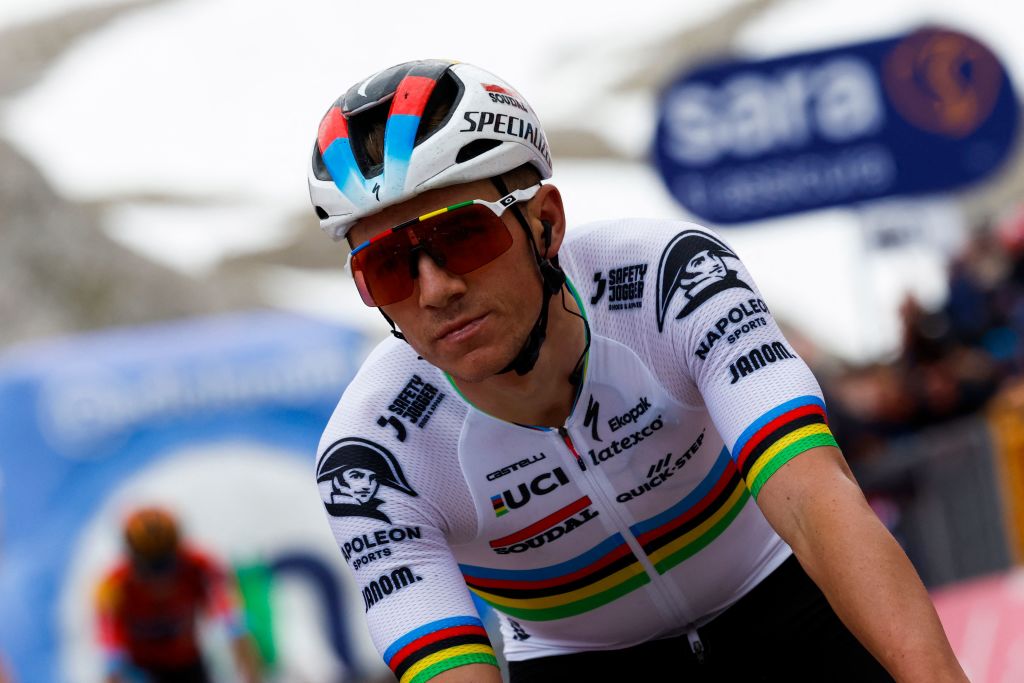'It was almost impossible to attack' – Remco Evenepoel on Giro truce at Gran Sasso
Headwind tempers summit finish but world champion jousts with Roglic in finale

And on the seventh day, they gave lie to the assertion that there is never a dull day on the Giro d’Italia – not that Remco Evenepoel was complaining after reaching Gran Sasso d’Italia with all of his overall rivals on stage 7.
“It was a perfect day for us,” said Evenepoel, who has now enjoyed two largely tranquil outings since he crashed twice on the road to Salerno on stage 5.
The long haul to Gran Sasso d’Italia billed itself as a test of Evenepoel’s recovery from those falls and of the strength of his Soudal-QuickStep team, but a stiff headwind on the interminable climb to the line essentially neutralised the race among the GC men. They climbed the snow-banked final ramps in a group of 27, and the prevailing inertia was broken only in the closing 200 metres when the Arrivo banner reared into view.
Evenepoel being Evenepoel, he couldn’t resist a mild flex here, lifting himself from the saddle to outsprint Primož Roglič (Jumbo-Visma) to fourth place, 3:10 down on breakaway winner Davide Bais (Eolo-Kometa). With Andreas Leknessund (DSM) doing enough to retain the maglia rosa, Evenepoel remains second overall, still 28 seconds down on the Norwegian and 44 ahead of Roglič.
“It was quite a calm day for us,” Evenepoel said. “The truce came mainly because of the headwind, and it wasn’t easy to take the initiative. It was almost impossible to attack today. In those circumstances, you couldn’t expect much.”
Maintaining the status quo in the overall standings means that DSM will remain an ally of circumstance for Soudal-QuickStep on Saturday’s rolling run through Umbria to Fossombrone. The stage has the potential for late surprises, even if Evenepoel suggested the maglia rosa contenders were already casting their minds ahead to the crucial Cesena time trial in 48 hours.
“The finale is dangerous tomorrow, but I’m expecting a breakaway to stay clear,” Evenepoel said. “We’ll try to start focusing already on the time trial of Sunday.”
Get The Leadout Newsletter
The latest race content, interviews, features, reviews and expert buying guides, direct to your inbox!
Despite the tacit truce among the Giro favourites, the stage was still an arduous one, with the race going above 2,000m for the first time at the end of its 218km, with the temperature plunging as the road climbed. No matter, Evenepoel was rather better protected by his Soudal-QuickStep team here than he had been at Lago Laceno on stage 4, with Ilan Van Wilder, Louis Vervaeke and Jan Hirt prominent deep into the final climb.
“In the end, it was a good day even if it was tiring,” Evenepoel said. “It was long, and it was cold, but I was well wrapped up to protect myself, and the team controlled things well. It was a day without stress.”
The day’s lone frisson came in the closing metres, when Evenepoel and Roglic reprised a scene redolent of their duel at the Volta a Catalunya by sprinting for fourth place. There were no bonus seconds on offer, and there was little hope of opening a gap, but it was a chance for the two favourites to size one another up all over again. Evenepoel, in keeping with the tenor of the Giro to date, claimed another, minor psychological victory by nabbing forth.
“It’s always nice to win a sprint, but that wasn’t really important,” Evenepoel said. “Above all, it was avoid any problems. It’s better to finish at the front of the group than at the back.”
At day’s end, Evenepoel also looked set to win the race to his hotel. Much of the Giro gruppo descended from the finish to the bus parking in Assergi by cable car. Soudal-QuickStep, however, hired a helicopter to airlift the world champion from Gran Sasso d’Italia to his evening’s lodging in Terni. “I’m a bit scared,” Evenepoel admitted before taking to the air. It was the only thing to worry him all day.

Barry Ryan was Head of Features at Cyclingnews. He has covered professional cycling since 2010, reporting from the Tour de France, Giro d’Italia and events from Argentina to Japan. His writing has appeared in The Independent, Procycling and Cycling Plus. He is the author of The Ascent: Sean Kelly, Stephen Roche and the Rise of Irish Cycling’s Golden Generation, published by Gill Books.